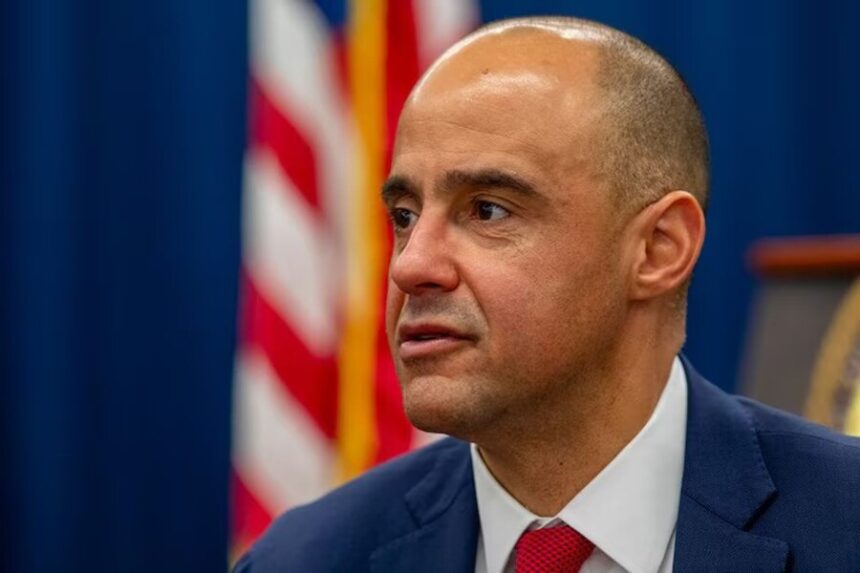Matthew Graves, the U.S. Attorney for the District of Columbia, announced his resignation on Monday, just days before President-elect Donald Trump’s inauguration. Graves, who was appointed by President Joe Biden, will step down from his position on January 16, marking the end of his tenure as the federal prosecutor for the nation’s capital. His resignation comes at a pivotal moment for the district, as Washington, D.C., reaches its lowest crime rates in over 50 years.
Graves has served as U.S. Attorney for more than three years, overseeing a period marked by intense political scrutiny, significant public safety challenges, and a city grappling with the aftermath of the COVID-19 pandemic. His tenure was not without criticism, as crime rates initially spiked post-pandemic, drawing bipartisan attention. Several high-profile incidents, including the armed carjacking of a congressman and the assault of a congresswoman in her apartment building, placed the issue of public safety at the forefront of political discourse.
Despite the criticism, Graves’ tenure is ending on a note of historic progress. His office implemented initiatives that have helped reduce violent crime in Washington, D.C., to levels not seen in over half a century. According to the Office of the Attorney General, 2024 will close as the district’s safest year in terms of total violent crime since the early 1970s. This achievement highlights a remarkable turnaround in public safety, reflecting a focused and data-driven approach to tackling crime.
Graves’ strategy centered on a comprehensive review of crime data to identify violent offenders and prioritize cases involving gun and drug-related violence. By focusing federal resources on the most dangerous offenders, his office was able to make significant inroads into reducing the factors contributing to the city’s crime. This targeted approach resulted in a 35% year-over-year decrease in violent crime in 2024, a statistic that underscores the effectiveness of these measures.
When Graves took office, he inherited a daunting array of challenges. The pandemic had left the district with a substantial backlog of over a thousand unresolved felony cases. Adding to the difficulty was the loss of accreditation for the D.C. forensic lab, which significantly hampered the processing of evidence. Furthermore, Graves’ office faced a surge in motions from defendants seeking early release, further straining the system.
By 2023, Graves and his team had managed to clear the backlog, a feat that required not only meticulous planning but also a steadfast commitment to ensuring justice was served. His office’s efficiency in handling these cases allowed for a renewed focus on proactive crime prevention measures, ultimately contributing to the historic decline in crime rates.
In addition to addressing local crime, Graves also led the largest investigation in the history of the Department of Justice: the probe into the January 6, 2021, Capitol attack. Under his leadership, federal prosecutors charged over 1,600 individuals involved in the insurrection, with nearly 1,100 of them receiving sentences. This monumental effort underscored the U.S. Attorney’s Office’s commitment to upholding the rule of law and addressing threats to democracy.
Graves’ resignation has sparked mixed reactions across political and community lines. Critics from both major parties had previously questioned his handling of crime in the district, particularly during the period when violence appeared to be on the rise. However, city leaders have acknowledged the significant progress made under his leadership, noting the targeted approach that identified and addressed the small group of individuals responsible for a disproportionate share of the violence.
The announcement of Graves’ departure comes at a critical juncture for the city. The incoming Trump administration has made clear its intention to focus on crime and public safety, with the president-elect frequently referencing urban crime rates in his campaign rhetoric. Graves’ resignation raises questions about the continuity of the crime reduction strategies that have proven successful in recent years.
Graves himself has remained focused on his achievements, emphasizing the progress made in reducing violent crime and the importance of maintaining a systematic, evidence-based approach to law enforcement. In his resignation announcement, he expressed gratitude to his team and the residents of Washington, D.C., for their support during his tenure.
As the district prepares for new leadership, many are reflecting on the impact of Graves’ tenure. His ability to steer the city through unprecedented challenges, from a public health crisis to one of the most significant criminal investigations in U.S. history, has left a lasting imprint on the nation’s capital. The sharp reduction in violent crime stands as a testament to the efficacy of his policies and the dedication of his office.
The legacy of Matthew Graves as U.S. Attorney for the District of Columbia is one of resilience and reform. While his resignation marks the end of an era, the policies and strategies implemented during his tenure are likely to influence the city’s approach to public safety for years to come. As Washington, D.C., enters a new phase of leadership and grapples with the ongoing challenges of maintaining public safety, the impact of Graves’ work will undoubtedly remain a point of reference in discussions about justice and governance in the district.




